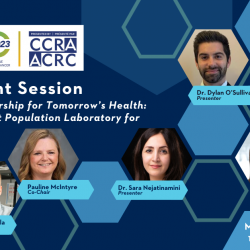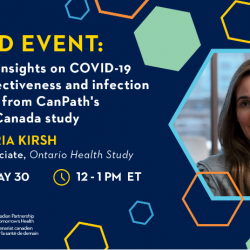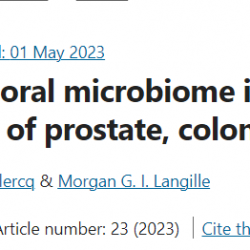Dr. Philip Awadalla, Scientific Director of CanPath, and Patient Partner/Atlantic PATH participant, Pauline McIntyre, will chair a panel at the Canadian Cancer Research Conference, “CanPath: Canada’s Largest Population Laboratory for Cancer Research” on Monday, November 13th at 11:40 AST. Presenters include Dr. Dylan O’Sullivan, Dr. Samina Abidi, Dr. Sara Nejatinamini, and Dr. Vikki Ho. Dr. Dylan O’Sullivan is a Research Scientist at Alberta Health Services and an Adjunct Assistant Professor in the Cumming School of Medicine, Department of Community Health Sciences at the University of Calgary. His research interests include reducing the cancer burden across the full cancer control continuum (prevention, screening, and outcomes) with the use of existing methods and the development of novel data analytics. Dr. O’Sullivan will be presenting on the risk factors for early-onset colorectal cancer using CanPath data. Dr. Samina Abidi is an Associate Professor in the Department of Community Health and Epidemiology at the Faculty of Medicine at Dalhousie University and is cross appointed in the Faculty of Computer Science. Dr. Abidi has a unique skill set where she is a clinician with an expertise in health informatics. Her research interests include health knowledge integration, modelling and computerization, patient-centred care, chronic disease self-management and behaviour modification, clinical guidelines based clinical decision support and care planning, ambient assistant living, data visualizations, health IT evaluation. Dr. Abidi will be presenting on a digital health and artificial based public health platform for cancer risk prediction using data from Atlantic PATH. Dr. Sara Nejatinamini is a Research Associate at Alberta’s Tomorrow Project. She received her PhD degree in Nutrition and Metabolism from the University of Alberta. Prior to joining the ATP, she undertook postdoctoral training at the University of Calgary with a focus on health inequities. Dr. Nejatinamini’s research interests include public health, nutrition and cancer. Her research focuses on the role of modifiable lifestyle factors on cancer and other chronic disease risk. She applies epidemiological and implementation science methods and principles in her research to identify factors to prevent cancer and other chronic diseases and inform health interventions. Dr. Nejatinamini will be presenting on changes in breast and cervical cancer screening during the COVID-19 pandemic using data from Alberta’s Tomorrow Project. Dr. Vikki Ho is the co-Scientific Director of CARTaGENE and holds the Chair in Sex and Gender Sciences in Cancer Research from the Canadian Institutes of Health Research. She is an Assistant Professor in the Department of Social and Preventive Medicine in the School of Public Health (ESPUM) at the University of Montreal and a Researcher at the affiliated Hospital Research Centre (CRCHUM). Dr. Ho’s research interests focus on the intersection of environmental, lifestyle, occupational, and individual susceptibility factors in cancer etiology. Dr. Ho will be presenting on CARTaGENE’s research platform and the wide array of data sources for cancer prevention research, including environmental factors and biomarkers. She will specifically focus on occupational exposures and lung cancer biomarkers, and occupational exposures to endocrine disrupting chemicals and colorectal cancer risk. Dr. Ho will also present a poster on the CARTaGENE cohort. Posters will be up for the duration of the conference and during viewing sessions on Sunday, November 12th from 12-1:30pm AST and Monday, November 13th from 1:10-2:40pm AST.





